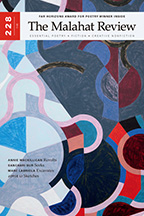Double Gemini: Kaye Miller interviews Sophie Crocker

Past fiction contributor Kaye Miller talks with Sophie Crocker, whose story “Castor & Pollux” appears in our fall issue #228. They discuss duality, reading recommendations for Geminis, and how the most difficult times are often the ones we can’t physically bear without levity.
[photo credit: Rylan Gladson]
Read an excerpt of “Castor and Pollux” here.
Sophie Crocker is a writer and performer based on stolen Musqueam, Squamish, and Tsleil-Waututh land, where she is a creative writing master's candidate at UBC. Her writing has appeared in Best Canadian Poetry 2023, PRISM International, The Fiddlehead, Contemporary Verse 2, and elsewhere. Her debut poetry collection, Brat, was released in fall 2022 from Gordon Hill Press. Find her on Instagram and Twitter at @goblinpuck and on her website, sophiecrocker.com.
“Castor and Pollux” plunges us headfirst into a hilarious dystopic world where people are conscripted to space-war based on their astrological sign. It is darkly funny, unexpected, and lively. Where did the seed of this delightfully surprising story come from?
Wow! Thank you! I barely remember writing this piece; it came together in a haze, mostly in my notes app. The first line came to me seemingly out of nowhere, though I’d been thinking a lot about how badly I’d do in a war draft. Originally, I thought I needed to ground it by setting it on Earth, even though the description was clearly of space, and my writing friends said, “If you just take out the names of countries, this is a way cooler space story.” And they were right. Otherwise, it barely changed from the initial notes-app draft. I wrote and workshopped “Castor & Pollux” at the same time and in the same way as this story in The Adroit Journal, if you want to read “C&P”’s sister story.
Duality is a big theme in this piece, as is inherent to the concept of the Gemini. The story is riddled with unlikely pairings—“rates of crime and improvised theatre,” long-lost twins, and the push and pull of the Gemini personality with the grim realities of being conscripted into a space war. What is it about this theme that intrigued you?
The specific line about crime and improvised theatre is definitely a reference to my own life, in that I’ve been accused of both. I’ve had a few people ask RE: this story if I hate Geminis, and I both love and hate them—that’s the whole point of a Gemini. I’m a double Gemini (sorry!!!) with a Gemini father, Gemini friends (duh), and a (redacted but embarrassingly high) number of Gemini lovers/exes. For a while, I was engaged to a Gemini with the same birthday as me. Even my cat is a Gemini.
There’s something very silly to me about Geminis. My theory about astrology is that while it isn’t “real” (cue tech bros cheering), there’s an emergent way in which it works (tech bros boo). That is, if you’re a January baby, you’re more developed than the other kids when you start school, and if you’re a June baby, you get to do your early growing in the sunshine. Things like that do affect a person’s development, so I think astrology has a point there. The environmental factors of each season affect how you grow. But that’s such a Gemini way to think about it: trying to make magic work through behavioural science.
Gemini-ness also interests me because of that yin-yang balance: how our best traits contain our worst ones and how impossible it really is to think about anything in a true binary. I tried to express that with this story. And there’s something so romantic, in the old sense of the word, about duos. It makes me think of the Pacific Rim concept of being drift compatible. What’s more intimate than that?
Though the piece is humorous, there is that aforementioned darkness to it—there is a subtle undertone of environmental crisis built into the piece, with the true purpose of this war being for resource extraction. The last line sees a glimmer of false hope, a bit of artificial light, but ultimately leaves us with no happy resolution for the Geminis. Could you speak on balancing levity and darkness in this piece, and in your broader body of work?
At least for me, it’s hard to be funny without darkness, and it’s hard to get dark (in a well-written way, at least) without humour. The most difficult times are often the ones we can’t physically bear without levity, similar to how if you’re badly injured, the adrenaline can hold off the pain until you aren’t in a moment of acute crisis. Jordan Peele’s movies are a good example of that, for me: the horror amplifies the humour, and vice versa.
Between reading this piece and your wonderful poetry collection, Brat, I am always impressed by your use of humour and the unexpected, and your unabashed playfulness in pushing boundaries. How do you experience moving between these genres? How does your poetry inform your fiction, and vice-versa? Where does the cross-over get muddy?
Thank you for saying that! I find it hard to decide sometimes if a title or premise should be a poem or a fiction piece or even a screenplay. Once I’ve figured that out, the lines are much easier to draw between the genres. Once I get more accustomed to flash fiction, that’ll start to blur the lines between fiction and poetry more. But for now, I can usually tell which is which. I do read a lot of writers who do both fiction and poetry, such as Ocean Vuong and Kaveh Akbar. (If you want to survive, do not take a shot every time I talk about Kaveh Akbar).
Could you leave us with some reading recommendations for Geminis, Gemini fans, or anyone else interested in the horoscope-based space-war?
Yes!! So many I can’t list them all, but check out Saturn Peach by Lily Wang (Gemini) and both of Gemini author Domenica Martinello’s books, Good Want and All Day I Dream About Sirens. OF COURSE read THE gay space-war book (even written by a duo), This Is How You Lose the Time War by Amal El-Mohtar and Max Gladstone. And my book Brat has a whole suite of horoscope poems, if you’re into that. (You can order it at www.sophiecrocker.com or wherever books are sold, btw).

Kaye Miller









